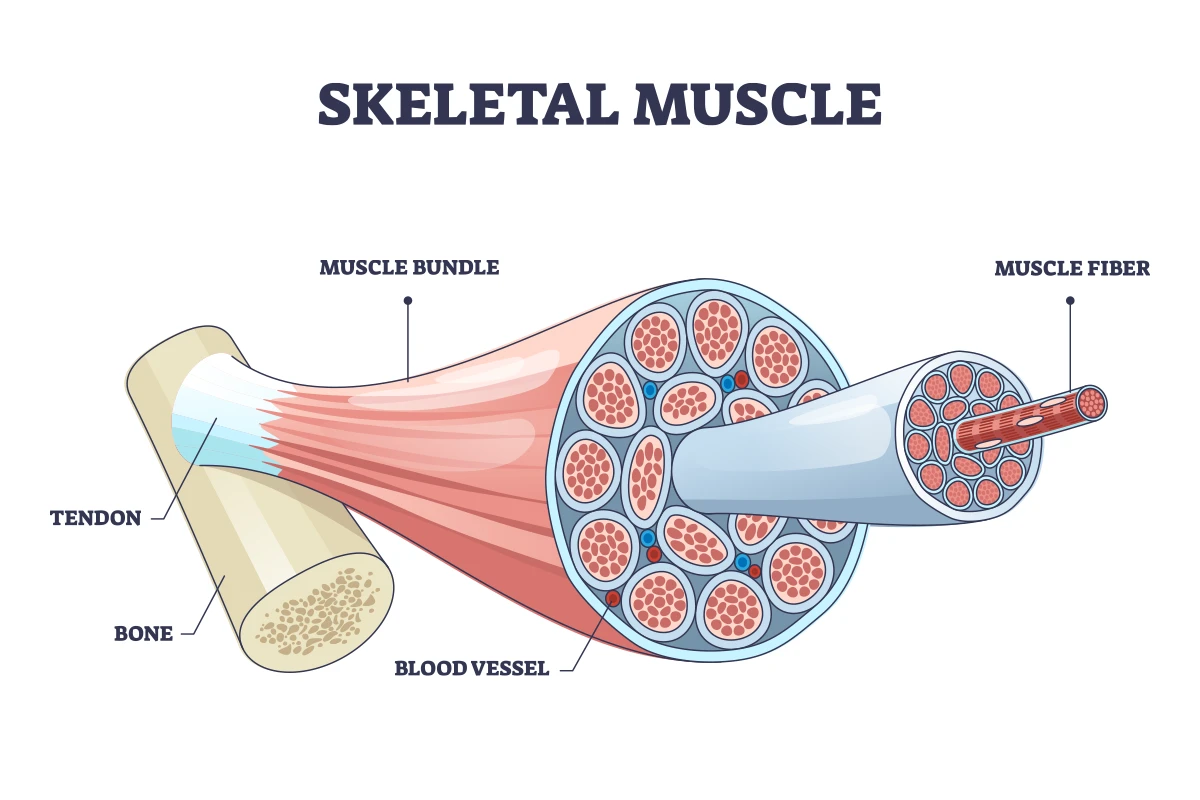Myopathy (muscle conditions)
Find a neuro specialistMyopathy is a term used to describe various conditions and diseases that lead to muscle weakness in the muscles attached to your skeleton (skeletal muscles). Each form of myopathy has distinct causes and symptoms.

Image shows how normal skeletal muscles are attached to a bone before damage from myopathy (muscle disease).
Types of myopathy
There are many types of myopathy. They’re generally divided into categories of inherited myopathies or acquired myopathies.
Understanding inherited myopathies
Inherited myopathies are conditions that you're born with, caused by mutated genes inherited from one of your parents. These conditions affect muscle function and can have various impacts on your body.
Some types of inherited myopathies are:
- Mitochondrial myopathy: This type is caused by mutations in mitochondria, which are the energy-producing components of cells. Along with muscle weakness, it can lead to complications affecting the brain, heart or gastrointestinal system.
- Congenital myopathy: Often associated with developmental delays in crawling or walking. They commonly affect all skeletal muscles and typically don't worsen over time.
- Muscular dystrophy myopathy: Involves progressive weakness of skeletal muscles.
- Metabolic myopathy: Typically causes random episodes of muscle weakness. These episodes often start due to activities like exercise or prolonged muscle use.
Understanding acquired myopathies
Acquired myopathy is any type of myopathy that develops later in life and isn't inherited from a parent. Unlike inherited myopathies, acquired myopathies arise due to various external factors or underlying health conditions.
Some examples of acquired myopathies and their causes are:
- Autoimmune myopathy: Triggered by autoimmune conditions, where the body's immune system mistakenly attacks its own muscle fibers.
- Dermatomyositis: Rare muscle disease identified by a distinct skin rash followed by or along with progressive muscle weakness.
- Toxic myopathy: Occurs due to exposure to certain substances like alcohol or specific medications.
- Endocrine myopathy: Arises from issues with endocrine glands responsible for hormone production. Conditions affecting glands like the thyroid or adrenal glands can lead to muscle weakness and dysfunction.
- Infectious myopathies: Stem from infections caused by bacteria, viruses, parasites or fungi.
- Critical illness myopathy: Develops in individuals in intensive care units, particularly affecting muscles used for breathing.
Myopathy symptoms
Given the diverse types of myopathy, symptoms can present in various ways. Typically, muscle weakness associated with myopathy tends to affect specific areas, such as the upper arms, shoulders and thighs. Muscular dystrophy myopathy follows a different pattern with muscle weakness often beginning in the face, hips and shoulders.
Some common symptoms across types of myopathies are:
- Being easily tired, especially after being active
- Low energy
- Muscle cramps
- Muscle stiffness
Myopathy symptoms can make everyday tasks, known as activities of daily living, more challenging. These tasks include getting dressed, personal hygiene, shopping, preparing meals or even getting in and out of a bed or chair. Recognizing these challenges and seeking appropriate support are crucial for managing the impact on your quality of life.
Myopathy complications
Myopathies may have serious complications such as sepsis, respiratory failure, kidney failure or cardiomyopathies (diseased heart muscle). Other possible myopathy complications are:
- Abnormal heart rhythms
- Cataracts
- Hypertension
- Impaired movement
- Irreversible muscle damage
Myopathy diagnosis
If you're experiencing symptoms that raise concerns about myopathy, consulting with a healthcare professional is a crucial step. During your visit, the doctor will conduct a thorough evaluation to understand your potential myopathy symptoms and determine an accurate diagnosis.
Talking openly about your symptoms, medical history and any concerns will help your doctor find the cause of your symptoms.
They’ll perform a physical examination, assessing your muscle strength, reflexes and overall mobility to help identify areas of weakness or abnormal muscle function.
To confirm or rule out myopathy, your doctor may recommend various diagnostic tests such as a CT or an MRI. Other tests they may recommend are:
- Electromyography: Measures the electrical activity going on in your muscles.
- Genetic testing: Uses samples of blood, saliva or urine to find genetic biomarkers that indicate disorders.
- Lumbar puncture: Extracts cerebrospinal fluid from your spine for testing.
- Nerve or muscle biopsy: Removes a small sample of a nerve or muscle for testing.
Myopathy treatment
Managing myopathy often involves a combination of medications, physical therapy and addressing any underlying causes.
Medications for myopathy may include drugs to improve muscle function, reduce inflammation, or treat underlying conditions or infections. In the case of autoimmune myopathy, treatment may include immunosuppressant drugs to moderate the immune response and steroids may be used to reduce inflammation.
Physical and occupational therapies are cornerstones of myopathy treatment. They enhance muscle strength, improve flexibility, optimize overall mobility and teach skills for activities of daily living.
By working with your health care team, you can help tailor a myopathy treatment plan that addresses your specific needs and improves your overall quality of life.
Get care
We help you live well. And we’re here for you in person and online.